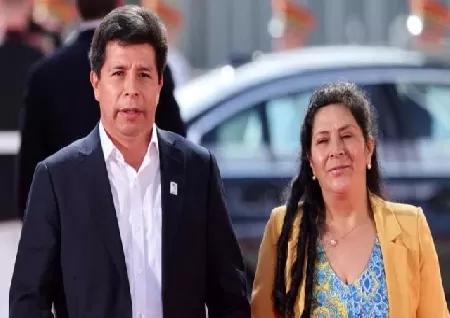Peru orders Mexico ambassador to leave after asylum

After granting sanctuary to the family of the deposed president, Peru orders Mexico's ambassador to leave.
Following the Mexican government's decision to offer asylum to the family of Peru's deposed president, the Andean nation's foreign ministry on Tuesday declared Mexico's ambassador to be "persona non grata" and ordered him to leave within 72 hours.
The decision, according to the ministry, was made in response to remarks made by Mexico's President Andres Manuel Lopez Obrador about Peru's political climate. The remarks, the statement read, "constitute unacceptable interference in internal affairs, in clear violation to the principle of non-intervention."
It comes after former Peruvian President Pedro Castillo's family, who were already residing in the Mexican embassy in the country's capital Lima, were offered shelter by Mexican Foreign Minister Marcelo Ebrard.
Castillo's family members were inside the diplomatic station, however Ebrard did not specify which ones, according to Peru's Foreign MinisterCastillo's family, notably his wife and children, will be given safe passage out of the country, according to Ana Cecilia Gervasi Diaz's statement on Tuesday.
Castillo, a former union leader and teacher from rural Peru, was impeached and removed from office about two weeks ago after attempting to dissolve Congress and impose an emergency government, a move that was denounced by MPs as an attempted coup.
He was detained while on his way to the Mexican embassy in Lima, according to prosecutors. He is currently being held in "preventive detention" for 18 months due to claims of insurrection and conspiracy, which he vigorously denies.
Castillo's impeachment has drawn criticism from Mexican President Lopez Obrador, who claims that the Peruvian was subjected to "abuse" by "his adversaries, especially the economic and political elites."
of that nation.
Castillo has allegedly been the target of "undemocratic harassment" since his election as president last year, according to a joint statement released last week by the governments of Colombia, Mexico, Argentina, and Bolivia. They urged Peru to respect the results of that election.
Lilia Paredes, Castillo's wife, is under investigation for allegedly organising a criminal organisation under Castillo's direction. Benji Espinoza, her former lawyer, had emphasised her innocence and claimed the inquiry of Paredes contained "a number of faults and omissions."
As the first female president of Peru, Dina Boluarte has had to fight off large-scale demonstrations over Castillo's removal from office. Boluarte has suggested that early elections could be held, however Defense Minister Luis AlbertoOtárola issued an emergency proclamation and sent soldiers into the streets.
According to data released by the Peruvian Ministry of Health on Monday, 26 people have died as a result of the violence, many of them residents of the rural and predominately indigenous region of Ayacucho in the south of the country, according to Reuters.
Furthermore, despite requests for early presidential and legislative elections, the nation is still in a deadlock because Congress last week rejected the constitutional amendment that would have allowed for early voting in 2023.
Boluarte is Peru's sixth president since 2018, and the country's political system has been riven with inefficiency for years.
Castillo ran for president on a platform of wealth redistribution and helping the nation's poorest citizens; before that, he had never held public office
Was rife with upheaval; in little more than a year, dozens of ministers were appointed, changed, sacked, or left their positions. Before being removed, Castillo himself was the subject of numerous corruption investigations and two failed efforts at impeachment.
Related queries to this article
- Peru orders
- Mexico ambassador
- leave after asylum
Read more articles and stories on InstaSity Trending Topics.
